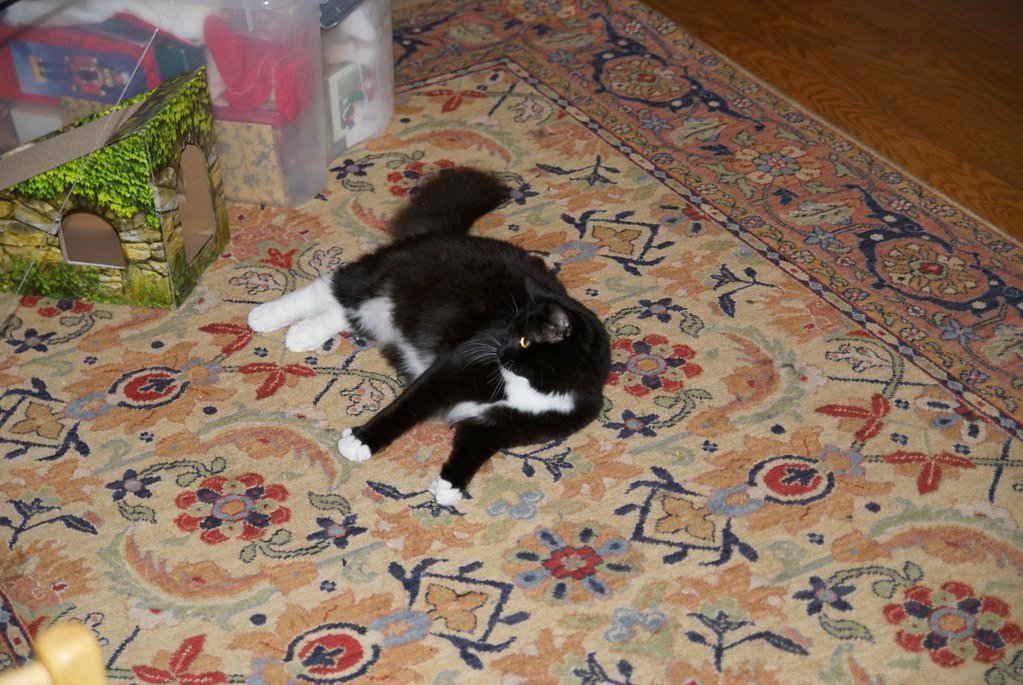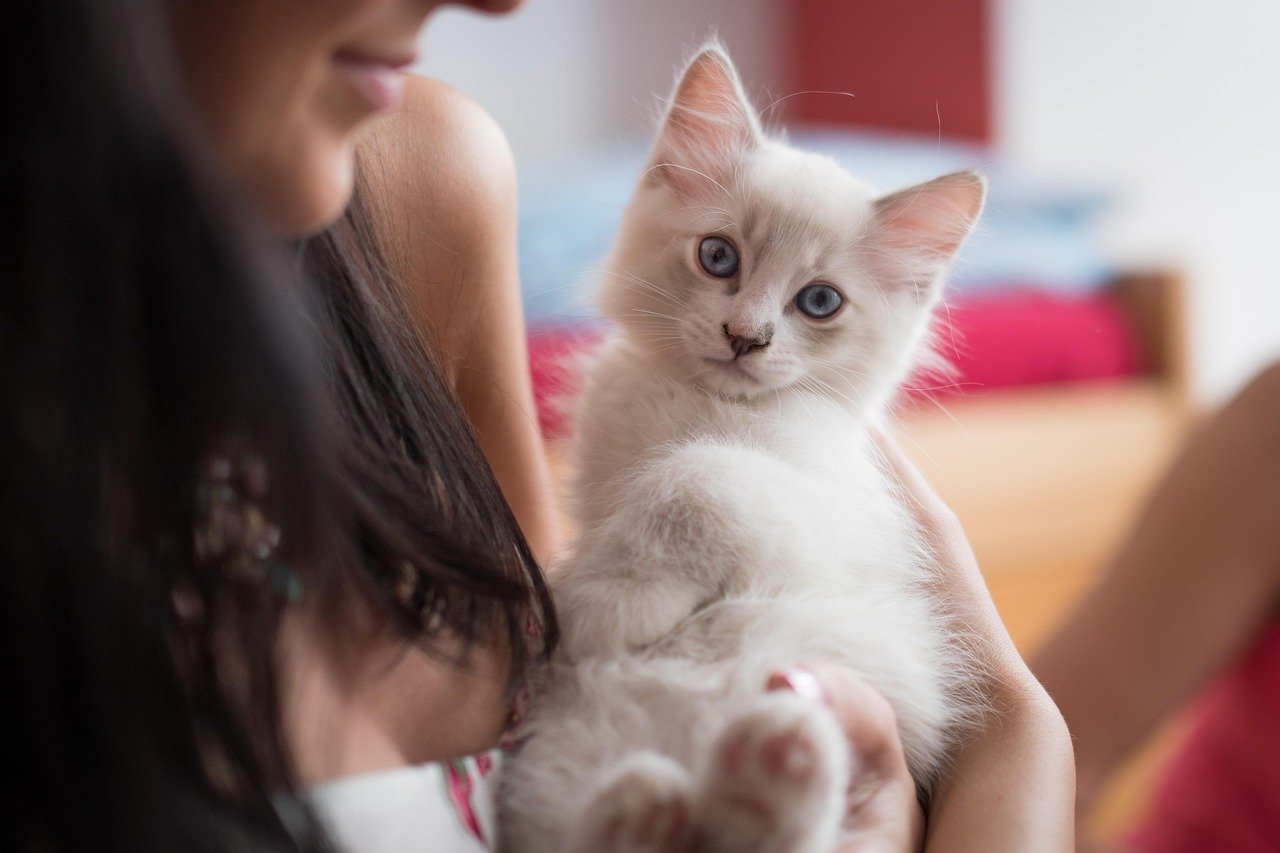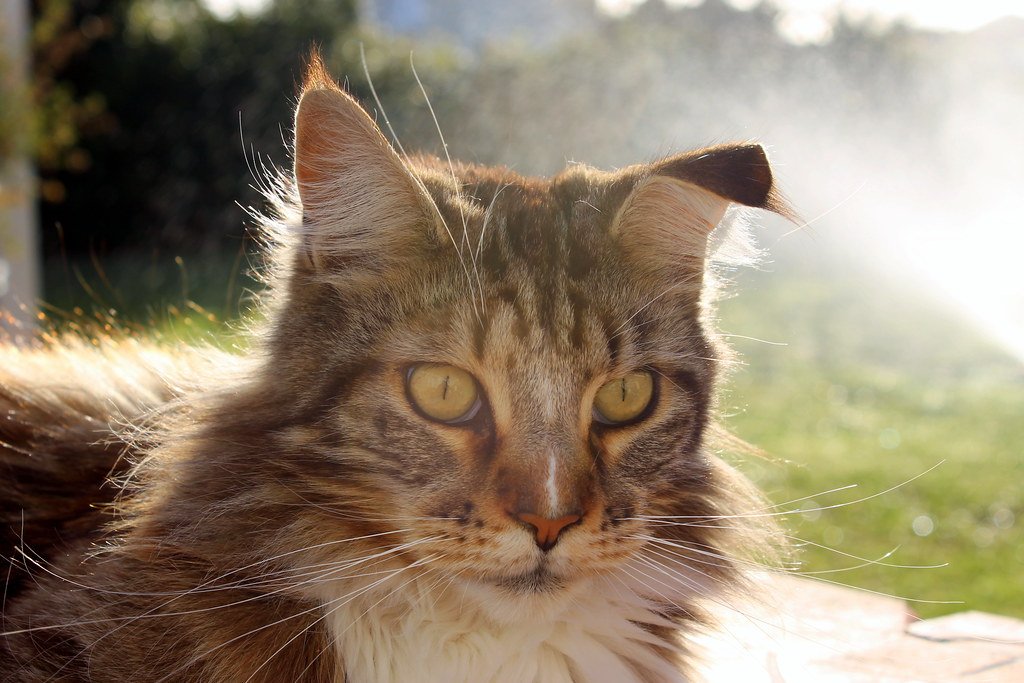The Ultimate Lap Cat in Action

Picture this: a cat that literally melts into your arms like warm honey. This Ragdoll demonstrates the breed’s signature trait of going completely limp when picked up, earning them their adorable nickname. Their muscles seem to turn to jelly, creating that famous “floppy” effect that makes them irresistible to cuddle.
What makes this moment so special is how the cat’s bright blue eyes remain alert and trusting, even as their body surrenders completely to relaxation. It’s like holding a furry cloud that purrs.
Those Mesmerizing Blue Eyes

Ragdolls possess some of the most stunning blue eyes in the feline world, and this photo captures their hypnotic quality perfectly. The depth and intensity of their sapphire gaze can stop you in your tracks. These aren’t just any blue eyes – they’re like looking into tiny oceans.
The contrast between their piercing blue stare and their soft, fluffy coat creates an almost ethereal beauty. Many owners swear their Ragdoll’s eyes seem to hold ancient wisdom, as if they understand every word you say.
The Famous Ragdoll Flop

This image showcases the breed’s most defining characteristic – the complete body relaxation that happens when they’re content. Unlike other cats who might tense up or prepare to jump away, Ragdolls literally go limp with happiness. It’s their way of saying “I trust you completely.”
The positioning in this photo shows how their limbs just dangle freely, creating that distinctive ragdoll appearance. Some people joke that Ragdolls forgot they were supposed to be independent cats – they’re more like feline teddy bears.
Gentle Giants at Rest

Here we see a Ragdoll in their natural state of blissful relaxation, showcasing their impressive size. These cats can weigh up to 20 pounds, making them one of the largest domestic breeds. Yet despite their substantial build, they move with surprising grace and gentleness.
The way this cat has arranged itself shows their adaptability – they can make themselves comfortable anywhere. Their thick, plush coat serves as their own personal cushion, making every surface a potential napping spot.
Color-Point Perfection

This stunning photo highlights the beautiful color-point pattern that makes Ragdolls so distinctive. Their darker ears, face, legs, and tail create a striking contrast against their lighter body color. It’s like nature decided to dip them in chocolate at just the right spots.
The gradual color transition from dark to light creates an almost artistic effect. Each Ragdoll’s pattern is unique, making them living masterpieces that develop their full coloration over the first few years of life.
The Puppy-Dog Cat

This image captures a Ragdoll displaying their famous dog-like behavior – following their human around the house. Unlike typical cats who value independence, Ragdolls crave constant companionship. They’re known to greet you at the door and follow you from room to room like a loyal canine.
The expression on this cat’s face shows pure devotion and attention. Many Ragdoll owners say their cats come when called, play fetch, and even walk on leashes – behaviors that would make any dog jealous.
Belly Up and Vulnerable

Few cats will expose their belly like this Ragdoll, demonstrating the breed’s remarkable trust and relaxed nature. This vulnerable position shows how secure they feel in their environment. Most cats guard their belly fiercely, but Ragdolls seem to forget this basic feline rule.
The complete abandonment of defensive postures in this photo is both endearing and remarkable. It’s as if Ragdolls live in a world where danger simply doesn’t exist – they’re the eternal optimists of the cat kingdom.
The Patience of a Saint

This photo captures a Ragdoll’s legendary patience, sitting calmly while probably being dressed up or posed for photos. Their tolerant nature makes them perfect family pets, especially with children who might not understand gentle handling yet. They rarely scratch or bite, even when annoyed.
The resigned but content expression tells the whole story – they might not love every situation, but they’ll endure it with grace. This patience extends to grooming, vet visits, and even wearing costumes during holidays.
Silky Coat in Motion

The way this Ragdoll’s coat flows and moves showcases their luxurious fur quality. Their semi-long hair has a silky texture that’s surprisingly low-maintenance despite its length. The coat seems to ripple like water as they move, creating an almost ethereal effect.
What makes their coat special is its lack of undercoat, which means less matting and shedding than other long-haired breeds. The way the light catches their fur in this image shows why they’re often called “living silk scarves.”
The Social Butterfly

This image shows a Ragdoll in their element – surrounded by people and soaking up attention. These cats are the ultimate social butterflies, often preferring human company to solitude. They’re known for their ability to read human emotions and provide comfort when needed.
The relaxed posture and open body language demonstrate their natural comfort with strangers. While many cats hide when visitors arrive, Ragdolls typically greet guests like old friends, making them excellent therapy cats.
Floor Cat Extraordinaire

Here’s a Ragdoll doing what they do best – sprawling on the floor in complete relaxation. Their tendency to lie flat on their backs or sides has earned them the nickname “floor cats.” They seem to melt into whatever surface they’re on, defying the typical cat preference for elevated perches.
The completely relaxed position shows their trust in their surroundings. Most cats maintain some level of alertness even while resting, but Ragdolls achieve a level of relaxation that’s almost meditative.
The Gentle Touch

This tender moment captures a Ragdoll’s gentle nature during interaction. Their soft paws and careful movements make them ideal companions for elderly people or young children. They seem to understand the need for gentleness instinctively.
The way this cat extends its paw shows their desire for connection without aggression. Ragdolls rarely use their claws defensively, preferring to communicate through gentle touches and soft vocalizations.
Sleepy Serenity

Nothing epitomizes the Ragdoll experience quite like this peaceful sleeping pose. These cats are champion sleepers, often spending 15-20 hours a day in various stages of rest. Their ability to find comfort anywhere is truly remarkable.
The complete abandonment to sleep shown here reflects their stress-free lifestyle. Ragdolls seem to have mastered the art of living in the moment, finding joy in simple pleasures like a warm sunny spot or a soft blanket.
The Therapy Cat

This image captures a Ragdoll in what appears to be a therapeutic setting, showcasing their natural ability to provide emotional support. Their calm demeanor and intuitive nature make them excellent therapy animals in hospitals, nursing homes, and counseling centers.
The focused attention and gentle presence visible in this photo demonstrate why Ragdolls are increasingly used in animal-assisted therapy programs. They seem to sense when someone needs comfort and respond accordingly.
Living Proof of Feline Evolution

This final image shows a Ragdoll in all their glory – a testament to selective breeding that prioritized temperament over appearance. Created in the 1960s, the breed was specifically developed to be the perfect companion cat. Looking at this relaxed, trusting face, it’s clear the breeders succeeded beyond their wildest dreams.
The contentment radiating from this cat’s expression tells the story of a breed that has truly found its purpose. They’re not just pets – they’re living proof that sometimes the best things in life come in soft, floppy packages.
Conclusion

These photos reveal why Ragdolls have captured hearts worldwide with their unique combination of size, beauty, and personality. Their nickname “floppy cats” barely scratches the surface of what makes them special. From their trusting nature to their dog-like loyalty, Ragdolls represent everything wonderful about the human-feline bond.
Whether they’re melting into your arms or following you around the house, Ragdolls remind us that sometimes the most profound connections come from simply being present with another living being. Have you ever met a cat that changed your entire perspective on feline companionship?
Hi, I’m Bola, a passionate writer and creative strategist with a knack for crafting compelling content that educates, inspires, and connects. Over the years, I’ve honed my skills across various writing fields, including content creation, copywriting, online course development, and video scriptwriting.
When I’m not at my desk, you’ll find me exploring new ideas, reading books, or brainstorming creative ways to solve challenges. I believe that words have the power to transform, and I’m here to help you leverage that power for success.
Thanks for stopping by, Keep coming to this website to checkout new articles form me. You’d always love it!






